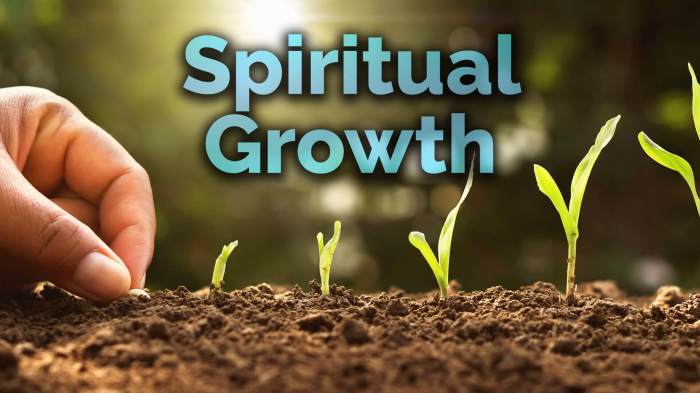Personal Development and Spirituality: A Journey of Growth

Personal development and spirituality, intertwined threads in the tapestry of human existence, offer a path toward self-discovery, fulfillment, and a deeper understanding of our place in the world. This journey of growth encompasses exploring our inner landscape, cultivating emotional intelligence, and aligning our actions with our values and purpose.
As we delve into the intersection of these two realms, we unlock the potential for profound transformation, leading to a more meaningful and fulfilling life.
Through self-reflection, mindfulness, and spiritual practices, we gain clarity about our strengths, weaknesses, and motivations. This awareness empowers us to cultivate empathy, compassion, and self-regulation, enhancing our relationships with ourselves and others. By connecting with a sense of purpose, we find direction and motivation, inspiring us to make a positive impact on the world around us.
The Intersection of Personal Development and Spirituality

Personal development and spirituality, though often viewed as separate paths, are intrinsically intertwined. Both journeys focus on self-discovery, growth, and a deeper understanding of oneself and the world. This intersection is where individuals find meaning, purpose, and a sense of connection to something larger than themselves.
The Relationship Between Personal Growth and Spiritual Exploration
Personal development and spiritual exploration are interconnected in a way that fosters holistic growth. Personal development often focuses on practical skills, emotional intelligence, and achieving external goals. Spirituality, on the other hand, delves into internal values, beliefs, and the search for meaning.
When combined, these two paths create a powerful synergy, leading to a more balanced and fulfilling life.
Spiritual Practices Contribute to Personal Development
Spiritual practices, such as meditation, mindfulness, and gratitude, can significantly contribute to personal development. These practices cultivate self-awareness, emotional regulation, and a sense of inner peace.
- Meditation: Meditation allows individuals to quiet their minds, observe their thoughts and emotions without judgment, and develop a greater sense of presence. This increased self-awareness translates into improved decision-making, reduced stress, and greater emotional resilience.
- Mindfulness: Mindfulness encourages individuals to be present in the moment, paying attention to their thoughts, feelings, and sensations without judgment. This practice helps to cultivate a sense of acceptance, reduces rumination, and fosters emotional regulation.
- Gratitude: Practicing gratitude shifts focus from what is lacking to what is present. It helps individuals appreciate the good in their lives, cultivate a positive outlook, and foster greater happiness and well-being.
Personal Development Goals Align with Spiritual Values
Personal development goals can align with spiritual values, creating a holistic approach to self-improvement.
- Compassion: A common spiritual value, compassion is a driving force for personal development goals such as volunteering or advocating for social justice. It fosters a sense of connection to others and encourages individuals to make a positive impact on the world.
- Forgiveness: Forgiveness is a powerful spiritual practice that can lead to personal growth. It releases individuals from the burden of anger and resentment, allowing them to move forward with a lighter heart and a greater sense of peace.
- Self-Acceptance: Self-acceptance is a core spiritual value that can be a powerful motivator for personal development goals. It encourages individuals to embrace their strengths and weaknesses, cultivate self-love, and strive for authenticity.
Self-Awareness and Inner Exploration
Self-awareness is the foundation of personal growth and spiritual development. It is the ability to understand our thoughts, feelings, motivations, and behaviors. Without self-awareness, we are like ships without a rudder, drifting aimlessly through life.
The Importance of Self-Reflection and Introspection
Self-reflection and introspection are essential tools for cultivating self-awareness. They allow us to step back from our daily lives and examine our thoughts, feelings, and actions with a critical eye. Through self-reflection, we can identify patterns in our behavior, uncover limiting beliefs, and gain a deeper understanding of our motivations.
This process can be as simple as taking a few minutes each day to journal about our experiences or as complex as engaging in deep meditation or therapy.
“The unexamined life is not worth living.”
Socrates
The Role of Mindfulness and Meditation
Mindfulness and meditation are powerful practices that can enhance self-awareness. Mindfulness is the practice of paying attention to the present moment without judgment. It involves observing our thoughts, feelings, and bodily sensations without getting carried away by them. Meditation is a form of mindfulness that involves focusing on a single point of attention, such as the breath, a mantra, or an image.
Regular meditation can help to quiet the mind, reduce stress, and increase self-awareness.
“The mind is everything. What you think you become.”
Buddha
Techniques for Identifying and Understanding Personal Values and Beliefs
Our values and beliefs shape our perceptions of the world and guide our decisions. Understanding our values and beliefs is crucial for living a meaningful and fulfilling life. Here are some techniques for identifying and understanding personal values and beliefs:
- Value Clarification Exercises: These exercises involve reflecting on our priorities and what is most important to us in life. They can help us identify our core values and how they influence our choices.
- Journaling: Regularly writing about our thoughts, feelings, and experiences can help us gain insights into our values and beliefs.
- Talking to Others: Discussing our values and beliefs with trusted friends, family members, or mentors can provide valuable perspectives and help us understand ourselves better.
- Self-Assessment Tools: There are many online self-assessment tools available that can help us identify our values, beliefs, and personality traits.
Developing Emotional Intelligence

Emotional intelligence (EQ) is the ability to understand and manage our own emotions and those of others. It is a critical aspect of personal development and spiritual growth. EQ enables us to build meaningful relationships, navigate challenges with grace, and create a more fulfilling life.
The Connection Between Emotional Intelligence and Spiritual Growth
Spiritual growth involves connecting with a deeper sense of purpose and meaning in life. Emotional intelligence plays a crucial role in this process. By cultivating self-awareness, empathy, and compassion, we develop a greater understanding of ourselves and others, fostering a sense of interconnectedness and expanding our capacity for love and forgiveness.
Cultivating Empathy, Compassion, and Self-Regulation
Empathy is the ability to understand and share the feelings of others. It involves actively listening, considering different perspectives, and recognizing the emotional experiences of those around us. Compassion is the desire to alleviate suffering and promote well-being in others.
It involves acting with kindness, understanding, and a willingness to help. Self-regulation refers to our ability to manage our emotions effectively, preventing impulsive reactions and maintaining emotional balance. It involves recognizing our triggers, developing healthy coping mechanisms, and practicing mindfulness to stay grounded in challenging situations.
Strategies for Managing Emotions and Developing Healthy Coping Mechanisms
Developing healthy coping mechanisms is essential for managing emotions effectively. Here are some strategies:
- Mindfulness and Meditation: These practices cultivate self-awareness and allow us to observe our emotions without judgment. Regular meditation can help us develop emotional resilience and create space between our emotions and reactions.
- Journaling: Writing down our thoughts and feelings can provide valuable insights into our emotional patterns and help us process difficult experiences.
- Physical Exercise: Physical activity releases endorphins, which have mood-boosting effects. Exercise can also help us channel negative energy into something positive.
- Connecting with Nature: Spending time in nature has been shown to reduce stress and promote feelings of well-being. Nature’s beauty and tranquility can provide a sense of peace and perspective.
- Seeking Support: Talking to trusted friends, family members, or a therapist can provide emotional support and guidance. Sharing our feelings with others can help us feel less alone and gain valuable insights.
Cultivating Meaning and Purpose

The pursuit of meaning and purpose is an intrinsic human desire. We yearn to understand our place in the world and to live lives that hold significance. While external factors such as career, relationships, and achievements can contribute to a sense of purpose, many individuals find that a deeper connection to something larger than themselves is essential.
This offers a framework for exploring these existential questions and finding meaning in life.
Spirituality as a Source of Purpose
Spirituality provides a framework for understanding our existence and our connection to the universe. It can offer a sense of direction and purpose by providing answers to fundamental questions about life, death, and the nature of reality. Spiritual practices, such as meditation, prayer, and contemplation, can help individuals connect with their inner selves and discover their values, beliefs, and aspirations.
These practices can also foster a sense of interconnectedness with others and with the natural world, contributing to a feeling of belonging and purpose.
Examples of Finding Meaning through Spiritual Practices
- Meditation: Regular meditation can cultivate mindfulness and self-awareness, leading to a deeper understanding of one’s values and goals. It can also promote emotional regulation and reduce stress, creating a sense of inner peace and purpose.
- Prayer: Prayer can be a powerful way to connect with a higher power and seek guidance and support. It can also foster gratitude and humility, reminding individuals of the interconnectedness of all beings.
- Service to Others: Engaging in acts of service can be a profound source of meaning and purpose. Helping others can create a sense of connection and fulfillment, reminding individuals of their humanity and the importance of contributing to the well-being of others.
Connecting with Others and the World: Personal Development And Spirituality

The journey of personal development is not solely about internal transformation; it’s also about how we engage with the world around us. Fostering meaningful relationships and extending compassion are essential components of a fulfilling life. Spirituality provides a framework for deepening these connections and inspiring positive action in the world.
The Importance of Meaningful Relationships
Meaningful relationships are crucial for personal growth and well-being. They provide us with a sense of belonging, support, and love. Strong social connections contribute to our overall happiness, resilience, and mental health.
- Emotional Support: Close relationships offer a safe space to share our vulnerabilities, receive empathy, and find comfort during challenging times.
- Personal Growth: Interactions with others provide opportunities for learning, expanding our perspectives, and challenging our beliefs.
- Sense of Purpose: Contributing to the lives of others and being part of a community can give us a sense of purpose and meaning beyond our individual goals.
Spiritual Practices Enhance Empathy and Compassion
Many spiritual traditions emphasize the interconnectedness of all beings and the importance of cultivating compassion. Practices like meditation, mindfulness, and service can enhance our empathy and understanding of others.
- Meditation and Mindfulness: These practices cultivate awareness of our own thoughts and emotions, enabling us to recognize and understand the experiences of others with greater clarity.
- Service to Others: Engaging in acts of kindness and service to those in need helps us connect with the suffering of others and develop a deeper sense of compassion.
Spirituality and Social Action
Spirituality can inspire individuals to take action and make a difference in the world. Many spiritual traditions emphasize social justice, environmental stewardship, and the importance of contributing to the common good.
- Social Justice: Inspired by principles of equality, compassion, and justice, many spiritual communities advocate for social change and work to address issues like poverty, discrimination, and inequality.
- Environmental Stewardship: Many spiritual traditions view nature as sacred and emphasize the importance of protecting the environment. This inspires individuals to engage in sustainable practices and advocate for environmental conservation.
Overcoming Challenges and Embracing Growth
Life is inevitably filled with challenges and setbacks. These experiences can be difficult to navigate, but they also offer opportunities for personal growth and transformation. A spiritual perspective can provide valuable insights and tools to help individuals overcome adversity and emerge stronger.
The Role of Spirituality in Navigating Challenges
Spiritual practices and beliefs can offer a framework for understanding and navigating challenges. By connecting with a higher power or a sense of purpose beyond the material world, individuals can find meaning and resilience in the face of adversity.
This connection can provide a sense of hope, support, and guidance during difficult times.
- Finding Meaning and Purpose: Spiritual practices can help individuals find meaning and purpose in their lives, even amidst challenges. By connecting with a greater sense of purpose, individuals can gain a broader perspective and find the strength to persevere through difficult situations.
- Developing Inner Strength: Spiritual practices often involve cultivating inner strength and resilience. Through meditation, prayer, or other practices, individuals can learn to manage their emotions, develop self-compassion, and cultivate a sense of inner peace. These qualities can be invaluable in navigating challenging circumstances.
- Acceptance and Forgiveness: Many spiritual traditions emphasize the importance of acceptance and forgiveness. Acceptance allows individuals to acknowledge and embrace their experiences, both positive and negative. Forgiveness, on the other hand, releases resentment and bitterness, freeing individuals to move forward with their lives.
Forgiveness and Acceptance in Personal Growth
Forgiveness and acceptance are crucial elements of personal growth, especially when dealing with challenging situations. These do not mean condoning wrongdoings, but rather releasing the emotional burden of anger, resentment, and bitterness. Acceptance involves acknowledging reality, even when it is difficult, and letting go of the need to control or change things that are beyond our control.
- Forgiveness: Forgiving others, and even ourselves, allows us to release the negative emotions that can hold us back. It can be a challenging process, but it ultimately frees us to move forward with our lives.
- Acceptance: Acceptance involves acknowledging our limitations and embracing the reality of our circumstances. It is not about resignation, but rather about finding peace and acceptance in the present moment.
Resilience and Strength Through Spiritual Beliefs
Spiritual beliefs can provide a source of strength and resilience in the face of challenges. Many individuals find solace and comfort in their faith, drawing inspiration from their beliefs to overcome adversity.
- Faith as a Source of Strength: For many, faith provides a sense of hope and purpose, even in the darkest of times. Belief in a higher power can offer comfort, guidance, and a sense of belonging, which can be invaluable during difficult periods.
- Spiritual Practices for Resilience: Spiritual practices, such as meditation, prayer, or mindfulness, can help individuals cultivate inner strength and resilience. These practices can help to manage stress, reduce anxiety, and foster a sense of peace and well-being.
- Examples of Resilience: Throughout history, countless individuals have drawn strength from their spiritual beliefs to overcome tremendous challenges. For example, Nelson Mandela, a South African anti-apartheid revolutionary, drew inspiration from his faith to endure 27 years of imprisonment. His unwavering belief in justice and equality ultimately contributed to the dismantling of apartheid in South Africa.
Living with Intention and Purpose

Living a life aligned with personal values and a sense of purpose is a journey of self-discovery and fulfillment. It involves understanding what truly matters to you, setting goals that resonate with your core beliefs, and taking action to bring your aspirations to life.
This intentional approach to life can be greatly enhanced by integrating spiritual practices, which can provide guidance, clarity, and a deeper connection to something larger than oneself.
Spiritual Practices for Guiding Daily Decisions
Spiritual practices, such as meditation, prayer, or spending time in nature, can offer valuable insights into our motivations, values, and priorities. They help us connect with our inner wisdom and access a sense of peace and clarity. By incorporating these practices into our daily routines, we can cultivate a more mindful approach to decision-making, ensuring that our actions align with our deepest values and aspirations.
- Meditation: By quieting the mind through meditation, we can gain a clearer understanding of our thoughts, feelings, and motivations. This heightened self-awareness can help us make choices that are aligned with our values and goals.
- Prayer: Prayer can be a powerful tool for seeking guidance and support from a higher power. It can help us connect with a sense of purpose and find clarity in challenging situations.
- Nature: Spending time in nature can be deeply restorative and provide a sense of connection to something larger than ourselves. It can offer a sense of peace, perspective, and inspiration, guiding us toward more fulfilling choices.
Examples of Integrating Spiritual Beliefs into Daily Life, Personal development and spirituality
Individuals integrate their spiritual beliefs into their daily lives in a variety of ways, depending on their personal values and practices. Here are some examples:
- Setting Intentions: Before starting a new day or undertaking a significant task, some individuals set intentions, aligning their actions with their spiritual values and goals.
- Gratitude Practices: Cultivating gratitude can be a powerful spiritual practice. Expressing appreciation for the good in our lives can shift our focus toward positivity and abundance.
- Ethical Decision-Making: Many individuals draw upon their spiritual beliefs to guide their ethical decision-making, ensuring their actions are consistent with their values of compassion, integrity, and fairness.
- Service to Others: A strong sense of purpose often leads individuals to engage in acts of service to others. This can be a powerful way to connect with a greater purpose and make a positive impact on the world.
Closing Notes
Embracing the journey of personal development and spirituality is a lifelong endeavor, filled with both challenges and triumphs. Through self-awareness, emotional intelligence, and a commitment to living with intention, we can cultivate a life rich in meaning, purpose, and connection.
As we navigate the complexities of life, we discover the profound power of our inner wisdom and the transformative potential of connecting with something greater than ourselves.
Comments are closed.